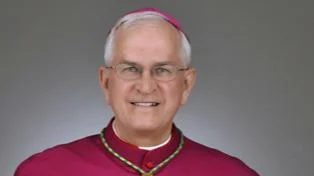
Reverend Joseph E. Kurtz, D.D. Bishop | Archdiocese of Louisville
Archbishop Shelton Fabre celebrated a Mass for Peace on the eve of the memorial of St. Peter Claver at the Cathedral of the Assumption on September 8. The Mass, organized by the Archdiocese of Louisville’s Office of Worship, included participation from the Knights of Columbus and the Knights of Peter Claver and Ladies Auxiliary.
During his homily, Archbishop Fabre highlighted the life and example of St. Peter Claver, a Jesuit priest who witnessed violence against enslaved Africans in Cartagena, Colombia, and sought to alleviate their suffering.
“As we seek to respond to the violence in our communities,” Archbishop Fabre said, “look to St. Peter Claver, who responded to the injustices he saw with a willingness ‘to do what he could do.’” He emphasized that St. Peter Claver acknowledged the dignity of each person he encountered as a response to community violence.
Archbishop Fabre urged respect for human life and dignity as a means to address various forms of violence in society. “One way we can respond to the multifaceted reality that is violence is by respecting human life and the human dignity of every single person, regardless of their race or the circumstances in their lives.”
He linked community violence — including poverty, economic hardship, racism, religious prejudice, capital punishment, abortion, and gun violence — to a “disregard of the value and human dignity of each person.”
The archbishop called on families to be "the first schools of love," teaching children peaceful conflict resolution. He also stressed rejecting divisive views that categorize people as "other," suggesting that encountering diverse individuals can remedy such thinking.
St. Peter Claver did not “sit around and discuss the evil deeds of others,” Archbishop Fabre noted. Instead, he encouraged advocacy for just policies because “peace flows from justice and right relationship with God and all others.”
“All must have value in our lives,” said Archbishop Fabre. Following St. Peter Claver's example, he concluded that responding to those who suffer is essential: “to respond to those who suffer and do what we can do.”

 Alerts Sign-up
Alerts Sign-up